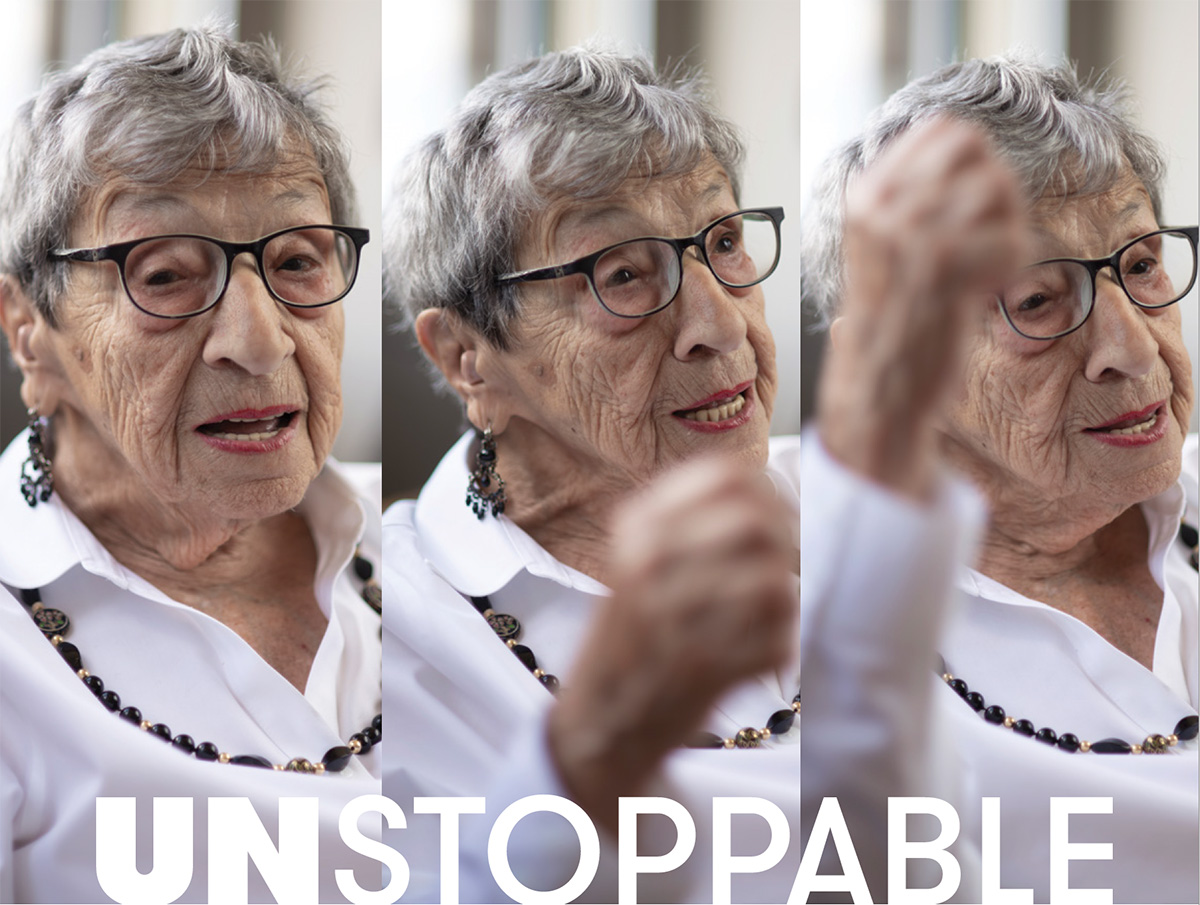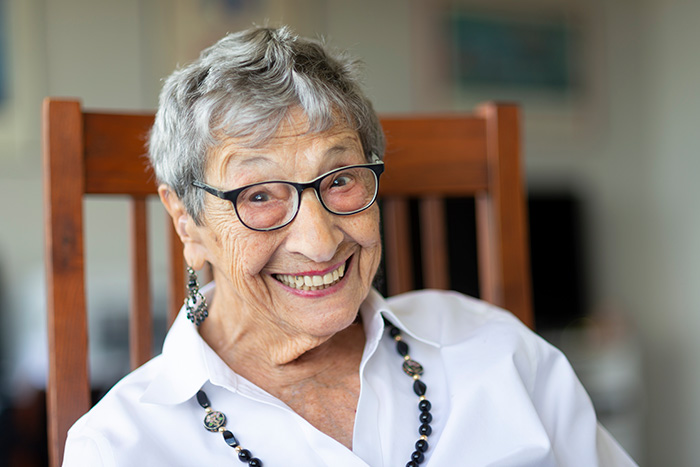

Beatrice Lumpkin (M.S. MT ’71), 101, will not stay still.
The petite, gray-haired dynamo fusses over her visitors, pouring cups of golden oolong tea and serving a bowl of artfully arranged cookies and chocolate drops in the living room of her home in Chicago’s Hyde Park neighborhood. She whizzes into the kitchen, opening drawers, before stopping briefly for a photo while standing atop her balance board. She then takes her guests on a tour of her top-floor senior co-op with its 270-degree views overlooking the city and Lake Michigan. Lumpkin sometimes watches jet skiers hurtling over the water through her telescope. She frets for their safety; after all, she says, she is a mother of four.
I
n a second bedroom, all admire Lumpkin’s east view of the lake. After commenting on the many sunrises she has enjoyed through that window, she points out a low-rise structure in the distance.
“You can see the steel mills, all the way over in Indiana,” Lumpkin says, her sprightly voice becoming a touch subdued, as if a small cloud briefly obscured the horizon.

Finally taking a seat at her dining room table (“I can see you including shots of me at 101, sipping my tea like a good centenarian should do,” she says, in characteristic good humor), Lumpkin talks about her storied life as labor activist, educator, and champion of the common person. She glances at her computer monitor, where a grandson has arranged a screen saver of personal photos as well as images of ancient Egypt, the country Lumpkin researched for her Illinois Institute of Technology master’s thesis in mathematics for teachers.
“The rough thing is when you look at a photo like that, well,” she says, nodding at a headshot of Frank Lumpkin, her husband of 61 years, who passed away in 2010 at 93. “Some of the people are no longer alive.”
An African-American Wisconsin Steel mill worker, Frank Lumpkin launched a 17-year battle to retrieve the pensions and lost wages owed to him and some 3,000 fellow employees when the Southeast Side plant closed without warning in 1980. His Save Our Jobs Committee succeeded in winning settlements amounting to $19 million. Lumpkin wrote about her husband’s activist roots and his fight for social justice in the 1999 book Always Bring a Crowd!: The Story of Frank Lumpkin, Steelworker.
“We were very much in tune with what we were trying to do. We were both lucky that we were together even at age 90, and enjoying life and loving each other. But I think the most important thing is, while most of us love our families, we have to think more about the entire human population as our family,” she says. “I realized from an early age that individual efforts cannot change all of the things that need to be changed; only a group effort can do that. There is a joy that comes with being a part of a group.”
Lumpkin chronicles this deep feeling, which seems to permeate her very being, as well as her own efforts to advance various labor movements in her 2013 memoir Joy in the Struggle: My Life and Love. The daughter of Russian Jewish socialist activists who eventually settled in the Bronx as laundry workers, Lumpkin credits her parents with igniting her power-to-the people philosophy. Likewise, Lumpkin’s son John, president of the Blue Cross and Blue Shield of North Carolina Foundation, has carried forward what his parents exemplified, influencing his own career paths in medicine, public health, and philanthropy.
“...while most of us love our families, we have to think more about the entire human population as our family.”
“We grew up in a home where the affairs of people in the United States and the whole world were part of our lives,” he recalls. “My mother gave us an appreciation of the impact that we could have on our fellow humans as well as a sense of obligation to do something. She has always lived with a confidence that our nation and the world can be improved if only we keep on trying.”
Professing a lifetime love of science, Lumpkin, a 2019 recipient of Illinois Tech’s Professional Achievement Award among other honors, became a mathematics instructor in 1967 at the future Malcolm X College, where she began investigating the mathematical contributions made by Africans and African Americans, largely unrecognized in traditional curriculums. She became a consultant on multicultural education for Chicago Public Schools and the Public Schools Multiethnic Curriculum Project in Portland, Oregon. To enlighten children about her findings, Lumpkin wrote Senefer: A Young Genius in Old Egypt, about a budding mathematician.
Lumpkin’s eyes shine when she talks about her support of young activists and her latest youth-focused initiative, INTERGEN, an intergenerational and multiracial coalition that she helped co-found in 2016. Jenny Carson, associate professor of history at Ryerson University in Toronto, Canada, who discovered Lumpkin when she was researching laundry workers during the Great Depression, perhaps best sums up the inimitable Lumpkin.
“Beatrice Lumpkin: social justice warrior, civil rights activist, organizer, mathematician and teacher, comrade, author, friend, mother, grandmother, great-grandmother, and inspiration and mentor to so many, including me,” she states. “Words cannot convey how many lives Bea has shaped through her fierce determination to make the world a better place and unbending commitment to social justice. Bea is an example of how one person can shape the arc of history.”